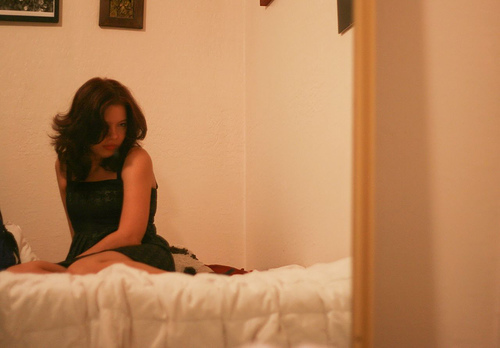There have been words for depression probably as long as there's been language. The Ancient Greeks merged their words for “black” and “bile” to come up with “melancholia”, a word that remains in use to this day. Perhaps not surprisingly, Google Translate offers 14 German words for “depression”. In the United States, we prefer to talk about depression in clinical terms such as “bipolar disorder”, while musicians and poets prefer more evocative words like “sorrow” or “woe”. Judging from its universality, depression may be a fundamental human affliction.
The experience is different for everyone: depression can be a brief and distinct experience for a person with a normally contended life, while some face the wintry doldrums of seasonal affective disorder when the days grow shorter. And for others such as myself, depression is like an ongoing river that only ebbs and flows, with no estuary in sight.
Depression is a serious affliction that affects 21 million U.S. citizens to varying degrees, according to a study by the advocacy group Mental Health America. Not surprisingly, there’s a number of different schools of thought on the best approaches to treatment—psychiatrists often encourage medication, psychologists prefer talk therapy, while alternative medicine practitioners often recommend herbal remedies. From my own lifelong battles with depression, anxiety, and ADHD, I can attest that for some people with particularly acute afflictions, prescribed medication plays a necessary role.
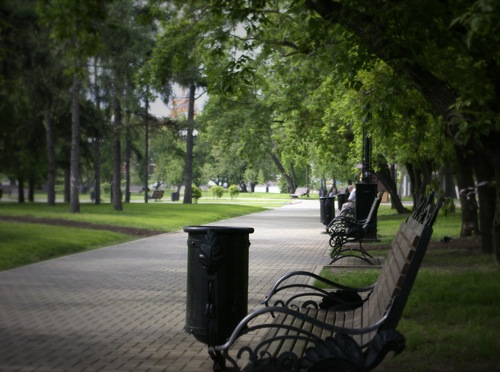
"Irkutsk City Central Square" by ~deloverov on DeviantArt.
Whether or not an individual takes medication, there is a rich body of research supporting the beneficial effects of holistic approaches. No matter whether you’re in talk therapy, taking antidepressants, or devoutly drinking St. John’s Wort tea, a healthy diet and an active lifestyle have been established to help reduce the symptoms of depression.
Food can play a major role in affecting your mood. And despite their demonization by the once-trendy Atkins diet, complex carbohydrates high in amino acids can boost serotonin in the brain. For both your physical and metal health, it’s better if you choose starchy root vegetables like squash, parsnips and turnips, and avoid easily-abused carbs like bread or cereal, which can be tempting foods for binge sadness-eating. As the UK’s Mental Health Foundation recommends, avoid saturated fats and refined foods, eat lots of healthy proteins and fish high in omega 3, and eat more greens—they’re more filling than sugary treats, and they don’t cause mood swings because their sugars are absorbed by the body more slowly. But food is only one part of the picture: exercise is equally important. In 1990, a research team led by psychologist Penny McCullagh, PhD concluded that “exercise was a beneficial antidepressant both immediately and over the long term” and that it “was an equally effective antidepressant for both genders.”

Photo by Skånska Matupplevelser on Flickr.
What's great about these holistic and low-cost approaches to mitigating depression is that they’re most effective when done with other people. That’s because the most effective non-pharmaceutical treatment for depression may be connecting with others. Drawing from research from a number of sources including Barbara L. Fredrickson, Ph. D, psychologist Ed Diener, and University of California Riverside professor Sonja Lyubormirsky, PBS’s This Emotional Life enumerates the close relationship between happiness and human connection, noting that belonging to a community provides a sense of identity, that researchers have found that both introverts and extroverts are happier when they’re with other people than when they’re alone, that the positive emotional effects of connecting with others is lasting, and that, just like sharing, happiness is contagious.
Whether you’ve got the winter doldrums or a more severe case of depression, there are a great many Shareable ways to eat better, become more active, learn some thing new, while meeting and engaging with a support system that already exists in your community and is waiting for you to join.
Food Swaps
Cooking Up a Story's food swap episode.
Some of us who are familiar with depression are no strangers to eating out of boredom or sheer necessity, reluctantly shoveling whatever leftovers or boxed foods are lying around the house into our gullets, and taking disinterested trips to the grocery store to buy the same old, and uninspiring, food items we always seem to end up with at the check-out aisle. A routine and uninspiring diet like this can be a source of sadness itself. So why not change things up, try some new foods, and meet the people in your community? Food swaps are a great way to shake up the dietary blahs, and since you’ll be cooking for others, that can inspire some fun experimentation on your own part. With the Internet, it’s never been easier to organize a food swap in your community, and Regan McMahon has some tips for starting your own. And if starting your own seems far too onerous or intimidating, foodswap.org offers resources and a directory of food swaps around the country.
Stranger Dinners
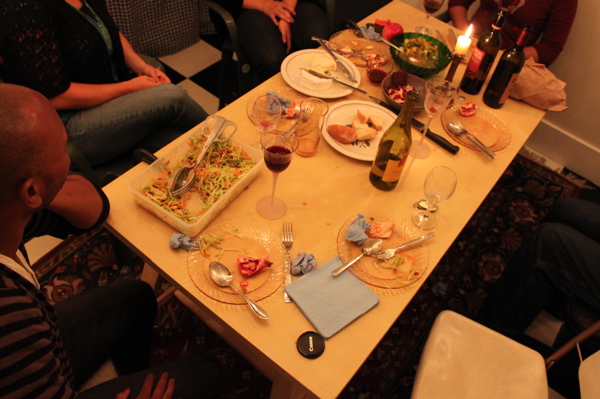
Photo by Arianna Davalos
In her essay “Why Talk to Strangers?”, artist Arianna Davalos writes of her post-college malaise, “I felt like I was lost in this big labyrinth and the whole world was at a party in the center of it.” It’s a sentiment that may ring true for many sufferers of depression, feeling disconnected and isolated from the world. In response, Davalos started hosting “stranger dinners”, at which she invited strangers in her community to her house for a potluck to connect with community and build resilience. Hosting a stranger dinner is no harder than throwing a casual dinner party, and can introduce you to a whole new group of friends and support system of people who are similarly displaced. If this sounds enticing, check out Davalos’s follow-up post, “How to Host a Stranger Dinner.”
Urban Farming
The last time I received a particularly frustrating email, instead of staring at my monitor and dwelling on it, I went into my back yard and tore some weeds out of my vegetable garden, which was extremely therapeutic. Working on a garden is a great way to get outside and do something satisfyingly physical, and it’s even better when you do it with others. Even if you live in the big city, pop-up farms are popping up (ahem) in cities across the world, even in metropolitan domains of steel and concrete like Manhattan. UrbanFarm.org claims that there are over 10,000 urban farms to date, and urbanfarming.org offers a useful directory of their locations in communities across the country. Rural dwellers are even embracing the community farming of livestock with neighborhood cows, pigs, chickens and more.
The Guerrilla Gardening movement even goes further, organizing to place tended gardens in the neglected land that dots the urban landscape as a green-thumbed approach to political resistance.

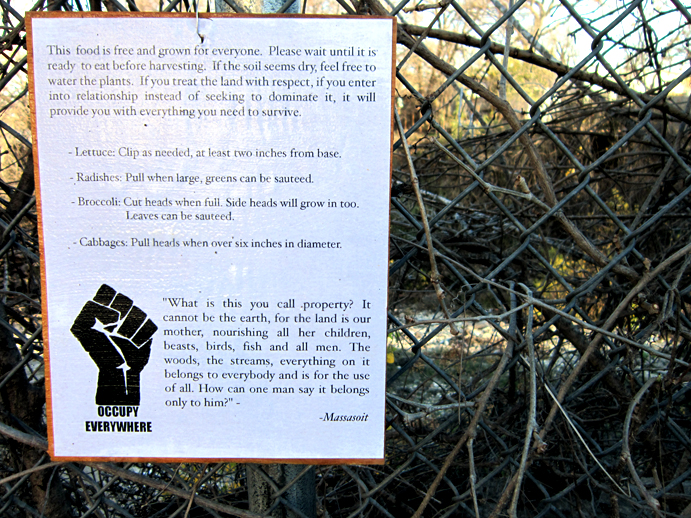
Photos of the handiwork of the Occupy Austin Guerrilla Garderners via Grow Food Raise Hell.
Community Bike Rides
If you find yourself compelled to spend your evenings and weekends staring at LOLcats online and watching bad reality TV, it’s time to get outside and get some fresh air and exercise with people in your community. Community bike rides are a great way to meet people, get exercise, and learn more about your city or town. Your local cycling association probably puts on regular group rides for cyclists of all levels of experience and fitness, such as the Austin Cycling Association’s “Scout-a-Route – Southern Culture off the Grid“ ride, a “no-drop, co-ed group ride is perfect for the cyclist new to riding or bike commuting, returning to the bike or just looking for a more casual ride,” or the San Francisco Bicycle Coalition’s Architecture Ride, with takes cyclists on a tour of the city’s rich architectural history.
FreeSkool: Attend, Teach, Or Start Your Own!
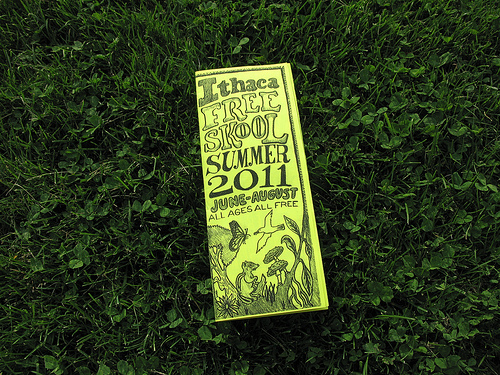
Photo by Shira Golding on Flickr.
Learn something new from other members of your community, or teach others about your unique area of knowledge! FreeSkools are cooperative community-based learning institutions—minus the institution and the tuition fees. The Ithica Freeskool (previously covered on Shareable,) is driven by the philosophy that “we are all teachers.” With upcoming classes on topics as varied as Aquaponics, bike repair, Capoeira, and GNU/Linux for beginners, it’s a great way to learn a new skill and get introduced to and involved with other people in your community who are passionate about a wide array awesome stuff.
There are FreeSkools in many communities, from Santa Cruz to New Orleans, Halifax to London. And if there isn’t one in your own neighborhood, why not start one yourself? The Freeskool Wikispace offers a detailed how-to document on starting a Freeskool in your community.
Occupy Everything, Including Your Depression

Photo from the Occupy Chapel Hill food tent by mr adam g on Flickr.
The effect of the current political climate and the recession on individual hardship and depression cannot be underestimated. One of the Occupy movement’s greatest assets is that it’s a big tent, uniting people of widely varied political ideologies from many different backgrounds. But Occupy is more than a global movement protesting political and economic injustices—it’s also a new way of building community and collaborating and interacting with people. Many of the social dynamics that exacerbate the symptoms of depressions—feelings of displacement and disenfranchisement, arbitrary hierarchy—are verboten in Occupy’s distributed, horizontal organizational system. In an article for The New Yorker, George Packer tells the powerful story of Ray Kachel, an unemployed video editor who was socially isolated who took a bus from Seattle to Occupy Wall Street and found a community of his own:
He volunteered for the newly formed Sanitation Working Group. To keep warm after dark, he spent part of each night scrubbing the paths and the sidewalks. Another occupier, seeing Kachel working, gave him a sleeping bag and a tarp. Kachel began making friends: Sean, an Irish immigrant from the Bronx who worked the graveyard shift spraying fire retardant on steel, then came downtown to spend his days at Zuccotti; a homeless substitute teacher with a degree in physics; Chris, a drifter from Tarpon Springs, Florida, who had been so outraged by a YouTube video of a New York City police officer squirting women protesters in the face with pepper spray that he had ridden the rails to Manhattan in order to defend female honor.
[snip]
So he didn’t panic when, one rain-swept night, his duffel was stolen as he slept, and water entered the tarp in which he was rolled up, soaking his sleeping bag, and he stayed calm when his daypack—including the portable hard drive—was taken away the next morning by zealous members of the Sanitation Working Group who were clearing out waterlogged objects, leaving Kachel with nothing but the clothes he had on. He simply turned to his new friends for help, and was given a dry sleeping bag. By then, he belonged to the occupation. Liberty Square was his home.
Connect With Your Online Social Network

"ObsessiveXplosiveBoundaries" by =asnakeproduction on DeviantArt
For some, depression and social anxiety can be so paralyzing that connecting to a community in the real world seems impossible. A paper by Harvard University physician and sociologist Nicholas A. Christakis and University of California San Diego political scientist James H Fowler published in the British Medical Journal investigated the importance of social networks to human happiness. In spite of the protestations of fear-mongering luddites, Christakis and Fowler followed the study by researching how these dynamics play out on social media sites like Facebook, and by studying 1,700 college students connected on Facebook reached the conclusion that “It…seems to be the case, online as well as offline, that when you smile, the world smiles with you.”
